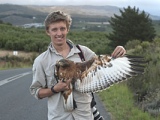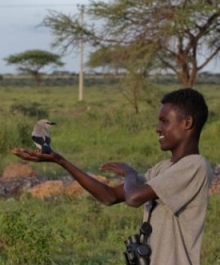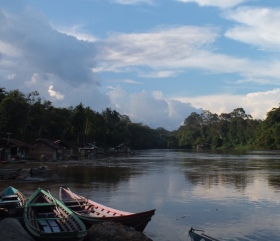One student's mission to document and study bird species across the globe

Recent Life Sciences postgraduate Sam Jones recounts his passion for birding and desire to share his wonder with a wider auidence.
“I’ve worked in all manner of funny places,” says Sam Jones, whose passport stamps certainly attest to this. In the past two years Jones has travelled to Borneo, Honduras, and most recently, Ethiopia, while studying and documenting far-flung bird species. After earning his MSc in Conservation Science this summer, he is back in the field and shows no sign of slowing down.
 An avid ornithologist and life-long birder, Jones relates his passion to the bigger picture of environmental awareness using photography, blogging, social media, video, and radio to document his projects and share them with the public. “I believe people are inherently interested in natural history in one way or another and it’s all about trying to bring that to someone’s curiosity,” Jones said.
An avid ornithologist and life-long birder, Jones relates his passion to the bigger picture of environmental awareness using photography, blogging, social media, video, and radio to document his projects and share them with the public. “I believe people are inherently interested in natural history in one way or another and it’s all about trying to bring that to someone’s curiosity,” Jones said.
In November, the BBC Radio 4 programme Shared Planet featured Jones as the guest contributor, discussing his thesis research on Ethiopian Bush Crows. This unique species of bird is found only within a very small area of acacia and thorn bush savannah that surrounds tribal cattle-grazing land. Instead of being displaced due to a human presence, the bush crows rely on the environmental modifications created by the traditional local culture.
Jones is also involved in research to establish inventories and population dynamics in remote, undisturbed habitats. These types of expeditions, like the two in Central America and Indonesia Sam was involved with, are often overlooked for funding; yet the data they yield is essential for conservation efforts. Having a model for how communities function in a pristine ecosystem gives biologists a baseline to which areas with increased levels of human impact can be compared.
"We're interested in the relationships between people and wildlife; in finding solutions that work for wildlife as well as people," says Professor E.J. Milner-Gulland, head of the Conservation Science (ICCS) group at Imperial. Located at the Silwood Park campus, the ICCS reflects Imperial's increasing commitment to science for environmental stewardship applications. The ICCS works in collaboration with Kew Garden, the Zoological Society of London, and Durrell Wildlife Conservation Trust to prepare students for hands-on work addressing current ecological problems.
"The students often say they learn more from their peers than they do from the teachers," E.J says and that's because I pick them that way."
Like Jones, the group's PhD and MSc students often have previous conservation experience, and come from a range of backgrounds and nationalities. The mix of personalities and abilities fosters a supportive community who can grow together. "They're going to be leadership material in conservation," E.J says, adding: "they're really going to make a difference."
 A case in point, Sam is currently at work on a birding project in the South Pacific. He plans to continue using media like radio to share his research and insights. "It's a really good way of conveying a message but through a storyline rather than just doom-and-gloom rhetoric about conservation, which I think engages a lot more people," he says.
A case in point, Sam is currently at work on a birding project in the South Pacific. He plans to continue using media like radio to share his research and insights. "It's a really good way of conveying a message but through a storyline rather than just doom-and-gloom rhetoric about conservation, which I think engages a lot more people," he says.
In the next several years Jones plans to pursue a PhD and to continue his involvement in conservation and ornithology projects.
"I'm not entirely sure how it's going to take shape, but as long as I can keep satisfying that core desire to go to new places, keep exploring things, keep discovering new things, and keep telling people about it, then I'll be pretty happy."
Article text (excluding photos or graphics) © Imperial College London.
Photos and graphics subject to third party copyright used with permission or © Imperial College London.
Reporter
Press Office
Communications and Public Affairs
- Email: press.office@imperial.ac.uk
